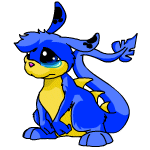 A Treatise on the Nature of Neopian Economics
by mithrandiel
--------
ALL OF NEOPIA - It is curious to think of the realm of Neopia as an economy, but
it truly is. Supply is always kept thin, save on the most ubiquitous items (such
as the majority of the items available the Tiki Tack shop), and demand is ensured
through quests and usage. Therefore, Neopets is subject to many of the same economic
principles that apply to our own world. Let us examine further these correlations.
Supply is the greatest determining factor of the price of any good (or, more
commonly, "item") available in Neopia. Suppose a new realm is "discovered" within
Neopia. Instantly, all items that are available within that new realm will be
worth a fortune as speculators buy out the stock of every store contained therein.
Supply, at this moment, is extraordinarily low, as the shops haven't been around
long enough to have restocked enough to saturate the market. Then, as time wears
on, the rarer goods from that new realm will continue to be high-priced (as
the supply remains low), while the more common ones will continuously drop in
price until they either (a) remain unsold in the shop because the market becomes
saturated and thus the goods are no longer profitable, or (b) they sell out
fairly steadily because enough demand is generated through quests and consumption
(of limited-use goods, at any rate) to keep supply and demand balanced. This
is a true distillation of the Neopian supply principles. One can usually tell
by the rarity index value of a given item how hard to obtain it is--but the
Shop Wizard is usually an even more accurate assessment.
This brings us to another oddity of the Neopian economic system. Economics
takes place at blistering speeds, but the marketplace tends to be the limiting
factor. With the Shop Wizard, millions of purchases using the arbitrary currency
of Neopoints (which can be gained by playing games, of all things) are completed
in mere instants, and the lowest price bracket is always rewarded. This ensures
competition in the market--if your goods are priced too high, the only way you'll
sell them is if someone crippled by a Faerie Quest (and thus unable to use the
Shop Wizard) stumbles falteringly across your shop, and desperately needs the
item contained within. (Sadly, this is very rare nowadays--many people simply
refuse Faerie Quests the minute they get them, because it's usually not even
worth the trouble and the hindering disability of being denied the Shop Wizard
until the quest is complete.)
One can see how supply is the king of price determination through such relics
as the Brain Tree. The old items that the Brain Tree has been giving out for
quests over the years (such as the Pumpkin Shield and the Brain Tree Root) were
once exceedingly hard to get a hold of, but are now quite cheap (even though
they still claim to be exceedingly rare). Even though their relative rarity
made them priceless at one point, the build-up of these and other non-consumable
goods renders them not even worth a second glance as time passes.
Demand is principally defined by how useful the item is, and how many times
it can be used. For example, the cheaper, non-profitable items at the Food Shop
routinely sell out, because people can buy them for their pets. In satisfying
their pets' hunger, the buyer's items are used up, and thus they must continue
to procure nourishment. Low-priced food that resellers don't want is usually
available there, and so it all ends up selling. However, many people want rare
stamps because they can get chat board avatars, trophies, and the like, and
having a stamp in your collection effectively removes it from the market. Doubloons
are always high-priced because people want them to buy things from Krawk Island.
The same goes for Nerkmids. Items that are destroyed/used up/consumed when they
are used as intended will always be more expensive.
Medicines are a prime example of this. One can tell which Neopian illnesses
are most common simply by assessing the prices of their respective cures. If
a new item has been introduced that causes, say, Floppy Tongue, the Tongue Shrinker
medicinal item will instantly skyrocket in price. If Itchy Scratchies are only
caused by random events (i.e. "Something has Happened!"), then Itchy Scratchy
Tablets will remain at a low cost in the shops of Neopian citizens.
But what of items that tend to be redistributed all over Neopia like fruitcakes
in the holiday season? I speak of the Palm Fan, the Neopian Times Issue 3, the
Bit of Barbed wire...these items have no demand, but outrageous supply. The
reason? They're useless, but free. The Tombola gives out many booby prizes that
are of no value whatsoever, but since they're free, they're everywhere. Pick
Your Own yields many pieces of junk, but since they came along with the berries
for such a low price, no one bothers to discard them.
The Money Tree does nothing to help with this passing of junk. People think
that donating items may help them garner some arbitrary fortune (perhaps an
effort to encourage philanthropism by the Neopets Team?--superstition abounds),
but who wants to donate something useful? The answer is to donate worthless
junk, hoping that, should there be some donation reward programmed into the
Neopets framework, the computer-ish logic will fail to notice it was only a
Tombola Keyring.
Neopian residents are quite entrepreneurial, even occasionally at the risk
of fraud. Any rare item will always be sold at the highest possible price (usually
at the Trading Post or Auction House to circumvent the 100,000-NP limit in effect
in the rest of Neopia), even if it cost practically nothing to procure it. Claims
that items such as the near-worthless Super U-Bend come from the Hidden Tower
(as it looks very similar to the U-Bend of Great Justice, which does, in fact,
come from the Hidden Tower) can be seen on a regular basis in the Trading Post,
and more than one hapless Neopian has been bluffed into paying the quackish
seller far more than it's worth in items and NP.
The Hidden Tower is one portion of Neopia that is essentially immune to standard
economics. Its items are essentially only available there, and are priced insanely
high (though many argue that their utility makes this worthwhile). But since
they are always in stock so long as the Neopets Team decides they will stay
there, there's no reason to buy them for resale, because no one will buy them
from you at a higher price. Selling them for less than they were bought for
is silly, especially when they're so expensive to begin with. As a result, only
Hidden Tower items of times past that are no longer available can typically
be found in the Neopian marketplace. (Many of those are also rare--there are
many serious collectors in Neopia that would like to keep the items for themselves.)
Neopia is a miniature economy that is fascinating to most students of economics
and non-students alike, and entertaining for nearly anyone who has the time
available. The Neopian microeconomy, however, could conceivably be used to test
out various other economic hypotheses that are being suggested for the real
world. It will doubtless remain a distillation of the market economy system
so long as it is in existence.
| |
|
Search the Neopian Times
Great stories!
---------
 Judgment: Part One Judgment: Part One
Memory filled the room, if the room had not
been so empty, the memories would have been lost in the clamor of everyday life,
but because there was so little, even the most transparent of thoughts filled
it with vivid pictures...
by orginalcliche |
---------
---------
 Night Walker: Part Six Night Walker: Part Six
"You want it? Then take it!" I didn't reply;
it was a challenge, I lived for challenges. I whirled around and leapt at the
stone tower and began scampering up the side. I heard the ghosts let out little
noises of shock and outrage.
by ruin_star |
---------
|
|